'When You Come Here, You Learn to Disassociate Politics from Culture and People'
On August 15, the second HSE Summer University drew to a close. The number of participants in this year's programmer nearly tripled with 103 students coming from 15 countries. This included both independent students as well at five organized groups from Seoul National University, Seoul National University of Science and Technology, Miami University, the German Academic Exchange Service (DAAD), and Guangdong University of Foreign Studies.
The students were able to choose up to six classes from various areas including Politics&International Relations, Russian Studies, Economics, and Culture. For the first time ever, courses were also available in computer science, and students were able to go on a weeklong trip to St. Petersburg to take a history class. The students from Seoul National University had their own programme. They took intensive Russian language courses in small groups, as well as a special course called Understanding Modern Russia. Students from Miami University, in addition to the Summer University classes, took courses as part of an intensive 10-week summer school in Russian carried out by the Faculty of Humanities. In addition, the Chinese students were able to take a course by Professor Zuev (Challenges to EU–Russia Economic Links) and by Professor Zakharov (BRICS Countries and the Emerging Global Order). Professor Maslov from the School of Asian Studies also gave a lecture on Chinese culture, which was both unexpected and interesting for our Chinese guests.
Other instructors also took part in the Summer University, including those from the Faculty of World Economy and International Affairs; the Faculty of Business and Management; the Faculty of Computer Sсience; the Faculty of Communications, Media and Design; and the Faculty of Humanities.
‘By participating in the Summer University, students are able to acquire new knowledge, work on their Russian, immerse themselves in Russian culture, and learn more about modern Russia, all the while making new friends from different countries. Next year, we are planning to expand the line of history and culture courses, and we might add a new group of classes in mathematics. In addition, there are plans to carry out separate courses not only in St. Petersburg, but at different HSE campuses as well, including Nizhny Novgorod and Perm,’ Summer University director Oksana Chernenko notes.
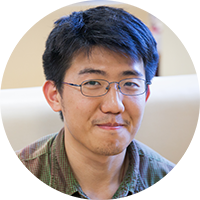
Lijia Lin, University of Michigan, Economics and Mathematics
I had two reasons for coming to the Summer University. First, I’ve studied Russian for one semester in my university – the Russian language has always amazed me by its word usage. I am very interested in learning Russian, which is a rather difficult language, so I came here to study Russian.
And my second reason was to research master’s programmes in Russia. After I finish my bachelor’s in the U.S. I want to apply to a master’s programme in Economics or Politics in Russia. I feel like Russia is a rising power, so I want to become a specialist in Russian relations. There are no such specialists in China or the U.S. at the moment. I think that if I want to get this knowledge, I need to come to Russia and learn it here. My situation is very complicated – I am Chinese, but I study in the U.S. so I get information from both sides. In China, Russia is viewed as the most loyal strategic partner, while in the U.S. the media demonizes Russia. I wanted to find out what Russia really looked like, and the same time I wanted to come here to HSE to see how the mater’s programmes are organized and which programme might interest me most.
At the moment I see four interesting programmes – Financial Economics, Applied Economics, Comparative Social Research and Applied Economics & Mathematical Methods – two of them are partially taught in Russian so I will need to improve my Russian. I am thinking of coming to HSE after I graduate this December to take an intensive 6-month Russian as a Foreign Language course. Hopefully, by the end of the programme I will have a sufficient knowledge of Russian.
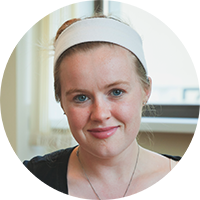
Shelby Allinder, American University (U.S.), International Relations
I came here on a scholarship from my home university. I haven’t studied abroad before and I am very happy to have had this experience. When I came here I knew only four Russian words, now I know quite a lot. The Russian language course I took during Summer University was fast, intensive and extremely productive. I am not nearly as fearful as I was – I can talk to people in the street now, and I am very glad for the experience. Living in the country you are learning the language a lot better than just learning it at university. Previously I studied German and I only started learning Russian here despite the fact that I studied Russian Politics and History. I know it sounds odd that I study Russia but don’t speak the language – so coming here was meant to fill that gap. I also took an EU-Russia Relations course, Russia and Non-traditional Security Challenges and Russia-US Relations. I was surprised to learn how important visa policy is and how significant this issue is. I used to think that the biggest issues are anti-ballistic missiles.
I think in America when we think of Russia we don’t ever see the city or the country. But when you come here, you see the architecture, you talk to people and you learn to disassociate politics from culture and people. I visited many interesting places in Moscow. I was very much impressed with the city.
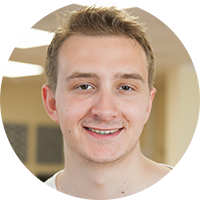
Amandeus Van Rossum, University College Roosevelt (Netherlands), Political Science
I took six courses. I found most of the courses interesting. I was especially interested in the EU-Russia relations and US-Russia relations. I found out a lot about Russian politics, BRICS countries, etc. And the Russian language course helped me a lot to get by in Russian. I haven’t studied Russian before. When I got here, I didn’t speak Russian at all, and now I can read it and speak it.
As for my motivation, I wanted to do something fun with my summer, something out of the ordinary. And I thought why not try this, which might be interesting for my future master’s. My major now is political science. I studied in the Netherlands at the University College Roosevelt in this place called Middelburg. I hadn’t heard about the Summer University programme before, I just typed ‘Russia university in Moscow’, and HSE was the first university that I found. And my impressions are really good. I never expected that I would meet so many great people, visit such interesting lectures and learn so much in such a short period of time. I have a very positive attitude towards the programme.
Unfortunately, I can’t take any classes of Russian at my university, as it’s quite small, but I want to come back here for the preparatory year, so after a year I hope that I will speak good Russian and pursue my master’s here.
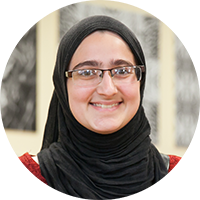
Saara Khalid, Miami University of Oxford, Ohio (U.S.), Psychology
I started taking Russian kind of on a whim. The more I studied it, the more I liked it. I’ve always wanted to study abroad, and I really wanted to come to Russia, so when I heard about this opportunity from professors in our Russian Department, I decided to come. It was really cool – I took a language course and then US-Russian relations and also History class in St. Petersburg. This is my first visit to Russia – I was really nervous but everything was really good. In addition, being a Psychology major I was a little concerned about my lack of background knowledge. But I must say that Prof Suslov who taught Russia-US relations was very accommodating about our knowledge – so for my final paper I was able to fall back on my Psychology studies and integrate my field of study into what was taught during the course. By the way, it was my first political science class ever! This was very interesting for me – in class I was trying to establish how what is being discussed relates to what I already know. It was actually nice to study something not related to Psychology – I take quite a lot of Psychology classes at my university.
I feel that my Russian has improved a lot – we got to practice speaking in the street or in the restaurants, ordering food, asking for directions. Also, I had a Russian roommate so I could talk to her every evening in Russian about how the day went. If I didn’t understanding something, she tried rewording it or speaking more slowly. I would like to continue studying Russian – I love the language – and I’m also thinking of applying to HSE’s English-taught master’s programme in Psychology.
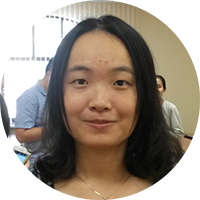
Winnie Yang, Guan (Coordinator of student group from Guangdong University of Foreign Studies)
I’m a staff member of the International Office at the Guangdong University of Foreign Studies. We rank one of the top universities of foreign studies in China. And we offer a range of 21 language courses in our university, which is the university with most foreign language studies. For most of us it’s our first time in Russia, and we have had great impressions of this country and the campus. There are some differences between Chinese and Russian universities. For example, in most Chinese universities we live and study in the same campus. But here it’s different: we live five subway stations away, and there are two building clusters across the street. And the food here is very different. For the first few days students felt a little bit confused about it. We’ve tried different dishes in the cafeteria and restaurants surround this building. We had a lot of potatoes, unlike in China where we serve rice for main dishes.
HSE organized special lectures for us. The first course was by Professor Vladimir Zakharov (BRICS Countries and the Emerging Global Order), who spoke about the BRICS and Shanghai Cooperation Organisation. He knows a lot about Chinese economics. We learned something new from him.
The second course was delivered by Professor Vladimir Zuev. He talked mainly about Russian economics and the links between Russia and the EU. Maybe because they know that all the members of the group are different majors, some of us do not know much about economics, but through the lectures we can really learn something new about economics, which makes us more confident. It really opened our eyes and helped us to know more. The last lecture was given by Aleksey Maslov, the Head of the School of Asian Studies. He is really good about China and Chinese culture. All of us agreed that he knows it even better than us. He talked about Chinese characters, festivals, etc. And he also told us that he has translated a lot of Chinese literature into Russian. And we appreciate that. Most of us admired him very much.
As for future cooperation, we have already signed an agreement on the summer programme between HSE and our university. And I hope that we can also develop the other kinds of programmes, like exchange programmes for students and staff members, some study abroad or double degree programmes. If it’s possible, it will be very good. I think most of our students would love to come here to study. If our students who major in Russian language will come here it would be very helpful for them.
See also:
Summer University 2023: ‘A Good Introduction to Urban Studies’
At the start of August, HSE University held the tenth annual Summer University. This year’s programme took the form of a workshop on urban studies. The participants attended four courses from HSE University faculty and invited experts and worked on their own projects to develop a cultural heritage site. Jung Woo Lee, from South Korea, shares his impressions of the Summer University.
‘I Have Always Respected the University’s Comprehensiveness and Inclusiveness’
Throughout July, students of the HSE International Summer University are studying Russian History and Behavioural Economics. The courses are taking place in an online format—something that seemed unthinkable for a summer programme before the COVID-19 pandemic. Recent years have shown that online learning is a unique opportunity for students from all over the world to study with leading HSE University professors from the comfort of their own homes.
‘In the Future, I Would Like to Become an HSE University Teacher’
Karina Kuzhanova, third-year student at the Faculty of Law, and Anna Yatsenko, second-year student at the Faculty of Economic Sciences, moved to Moscow from Kazakhstan to study at HSE University. They shared their impressions of studies and student life with the HSE News Service, as well as talking about some of the most inspirational things in the Russian capital.
HSE International Summer University to Offer Lectures in Partnership with Pompeu Fabra University
As a part of long-standing cooperation between HSE University and the Pompeu Fabra University, this summer, International Summer University in collaboration with Barcelona International Summer School (BISS) will organize a series of open lectures for participants of both summer programmes. Some of HSE Summer University courses are still open for registration.
Summer University to Be Held Online Second Year in a Row
International students from all over the world can enroll in HSE University’s summer programme, choosing from a wide range of courses that will be delivered via Zoom from June 20 till August 20, 2021. This year, Summer University is offering new courses, tuition fee discounts, and networking opportunities. Application deadline is May 20, 2021.
‘I Really Enjoyed This Summer School Experience’
The HSE International Summer University completed its 2020 session on August 20. Due to the pandemic, the programme was held online for the first time. Students from all over the world met on Zoom to study Russian language as well as take a variety of subject specific courses and participate in informal activities.
‘I Am Glad That I Made the Decision to Be at Summer University’
HSE Summer University, which has moved its classes online this year due to the pandemic, began on July 15. The programme will run until August 20, with students taking courses of various duration.
HSE Summer University 2020 to Be Held Online
HSE Summer University will begin on July 15 this year. All courses will be taught online via Zoom. The registration deadline has been extended until July 1, 2020.
Changes to HSE Summer University Dates
The coronavirus is strong, but together we are stronger. Let’s take care and stay safe, so that we can all soon embrace each other again. Due to recent travel and visa restrictions, as well as in the interest of students' health, the 2020 HSE Summer University session dates have been changed. Programme sessions will now begin on July 15 and conclude on August 20.
From Vladivostok to Philadelphia: Who Studied at HSE University This Summer
In early August, this year’s HSE Summer University comes to a close. For the first time, the school welcomed a group of Russian students from Far Eastern Federal University.


